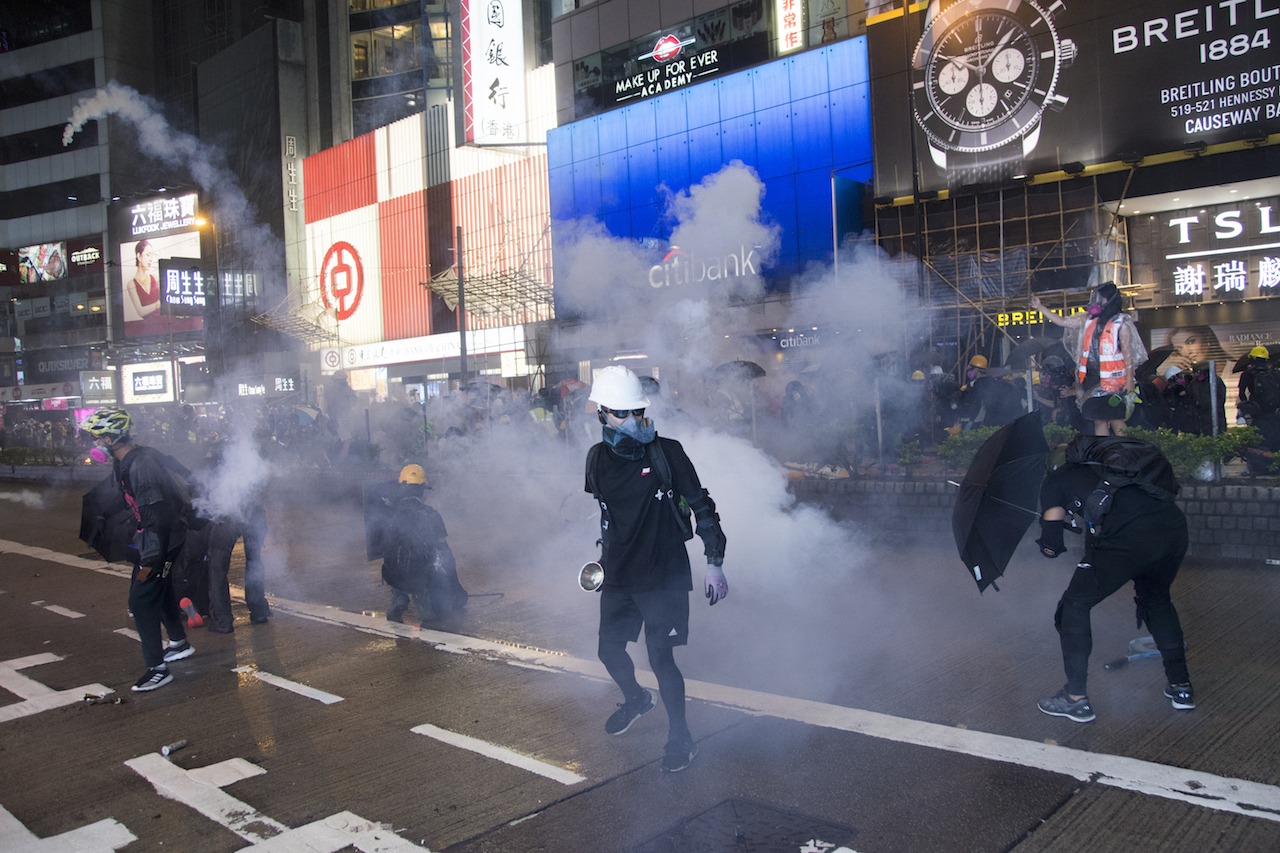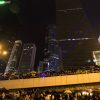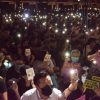Originally published in Jacobin. Republished with permission.
Less than five years after the Umbrella Movement, Hong Kong is back in international headlines. On June 9, over a million protesters dressed in white took to the streets to oppose a bill that would allow extraditions to China. The following Sunday, an estimated two million people—nearly 30 percent of the population—took to the streets again, this time clad in black.
Hong Kong’s pro-Beijing chief executive, Carrie Lam, claims that the extradition measure is needed to bring to justice a Hong Kong man wanted for murdering his girlfriend in Taiwan. But the bill has sparked immense opposition, with critics insisting the Chinese Communist Party (CCP) would use it to extradite activists or dissenting journalists to the Mainland. In other words, it would open the floodgates between the legal system of the Mainland and Hong Kong, and enable the CCP-sponsored kidnapping of Hong Kong citizens.
Police have responded to the demonstrations with force. When protesters initiated a peaceful sit-in on June 12, the original date for the second reading of the bill, police used rubber bullets, bean bag bullets, batons, pepper spray, and tear gas to disperse demonstrators. Footage of protesters shot in the head with rubber bullets and journalists beaten up by the police have leaked on the internet. To justify their crackdown, the Hong Kong government have claimed that the victims were unlawful rioters.
Yet despite the brutality, protesters stayed on the streets, blocking the government building. Last weekend, Lam relented and temporarily suspended the bill.
This week, protesters are demanding that the Hong Kong government walk back its characterization of the protests as riots and investigate the police’s use of excessive force.
Everyone knows the stakes are high: one outlet has dubbed it “Hong Kong’s last battle.”
Hong Kong’s History of Mass Mobilization
Hong Kongers have not always been known for mass mobilization. For much of its modern history, the British colony was seen as politically apathetic and “strictly business”—a haven for free-market economics and a demobilized citizenry.
In the 1980s, two landmark events changed that. The first occurred in 1984, when the Sino-British Joint Declaration sealed the colony’s fate of returning to Chinese rule. The second came in 1989, when the CCP massacred students and workers in Tiananmen Square.
The “One Country, Two Systems” policy had been introduced in the early 1980s, giving Hong Kongers a high degree of autonomy from Beijing. Part of the goal was to ensure that the Hong Kong people’s civil liberties would be protected. But after the 1989 massacre, Hong Kongers no longer trusted Deng Xiaoping’s promise for “fifty years of the old way of life.”
Sure enough, Beijing began to tighten its hold on Hong Kong after the handover, and Hong Kongers began to mobilize.
Unlike previous movements, the anti-extradition protest stands out for its leaderless and relative spontaneity.
In 2003, the pro-Beijing Hong Kong government attempted to enact “Article 23,” an infamous bill that prohibited “treason, secession, sedition, [and] subversion” against the Chinese government. Half a million people demonstrated against it. Their demands were met. The bill was withdrawn, and the chief executive, Tung Chee-Hua, stepped down. It was the first time the Hong Kong people had gotten a taste of their collective power.
The protest also marked the end of Hong Kong’s honeymoon with Beijing. Thereafter, the attacks on Hong Kong’s autonomy became more frequent and intense.
In 2012, the government introduced a bill that would put “moral and national education” into the core curriculum of primary and secondary schools. Students criticized the material as rigidly pro-Beijing, and a student alliance, Scholarism, initiated waves of sit-ins, demonstrations, and boycott campaigns.
In 2014, the Umbrella movement exploded following a proposal to allow the CCP to pre-screen candidates for the top role in Hong Kong—a direct attack on Hong Kong’s autonomy and already quite limited democracy. People spilled into the streets and occupied roads near the government headquarters and the central business district. Protesters stayed for seventy-nine days, demanding universal suffrage in chief executive elections. This time they were less successful—Beijing refused to allow Hong Kong to develop into a full-fledged liberal democracy. The chief executive remains an unelected position, and only part of the legislature is accountable to the voters’ will.
This month’s demonstrations are a reflection of Hong Kongers’ desire to hold on to the democratic rights they still have. But unlike previous movements, the anti-extradition protest stands out for its leaderless and relative spontaneity. While the veteran dissident coalition Civil Human Rights Front called the two Sunday demonstrations, many of the more militant sit-ins and occupations were organized by workers and students with little to no political organizing experience. In fact, the occupation of the police station this past week were sparked by “netizens” with no clear political affiliation.
It’s exactly this climate of relative political freedom that the extradition bill threatens. Under the protection of its current legal system, students can criticize a hyper-nationalist curriculum, journalists can voice dissenting views, and activists can organize without fear of abduction. The extradition bill would change all of that. If passed, it would no longer be safe for Hong Kongers to take to the streets and voice their dissent.
Hong Kong’s Relationship With China
To understand the current anti-extradition movement, it’s important to unpack Hong Kong’s relationship with China—one much more complex than “freedom versus authoritarianism.”
Hong Kong, unlike most colonies of the West, did extremely well after colonial rule. But this was by design.
In the two decades leading up to the 1997 handover, the British-ruled Hong Kong government instituted a series of reforms, ranging from health care to housing, that bettered the lives of ordinary people. Labor legislation was implemented to create stability for workers. Production was pushed up the value chain. English was taught in school to give the future workforce access to the western world. The goal was to drastically improve Hong Kongers’ quality of life and widen the territory’s economic distance from the rest of China to make it difficult for the CCP to govern.
The result was economic and cultural alienation from China. In 1997, Hong Kong stood out from the rest of the country as an international city and financial powerhouse. It stood for western capitalism against the backdrop of Communist China.
Given this history, it is easy to frame the anti-extradition protests as a fight between a westernized, capitalist Hong Kong and a poverty-stricken, socialist China trying to free itself from imperial shackles.
Like any capitalist state, the CCP will do what it needs to maintain the status quo.
But since Deng’s open-door policy in the early 1990s, China has transformed from a developing country into a global superpower.
The CCP, despite branding itself communist, enforces what would more accurately be described as “capitalism with Chinese characteristics”—a kind of state capitalism where political power translates to capitalist gain. And like any capitalist state, the CCP will do what it needs to maintain the status quo. With Xi Jinping in the top seat, the Chinese state has tightened its grip over both the Mainland and Hong Kong.
In the race for global economic dominance, Xi has pushed the multi-billion-dollar Belt and Road infrastructure project—planting the seeds for economic control throughout Africa and South America and signaling China’s desire to go to toe to toe with the US. But despite the CCP’s imperial ambitions, they dress up their actions in the language of anti-imperialism. Supporters praise the country as a counterweight to US empire. Likewise, to undermine the anti-extradition protests, the CCP has portrayed themselves as victims of western imperialism, suggesting that the demonstrations in Hong Kong are the work of western governments.
Still, we shouldn’t fall into a lazy (and pernicious) anti-Chinese posture. If the extradition bill passes, western nationalists will be emboldened to put more pressure on China. Already, the US has threatened to strip Hong Kong of its special economic trade status, which gives it preferential access to US markets. Doing so would provoke Beijing and damage Hong Kong residents in the process.
Amid the ongoing trade war and the scapegoating of China for the failing global economic order, protesters must not only reject Chinese authoritarianism and their empty anti-imperial narrative but western nationalist aggressions too.
The Politics of the Movement
It is no accident that Beijing’s expansion into Hong Kong has taken the form of economic encroachment.
Just last year, the pro-Beijing Hong Kong government pushed the “Lantau Tomorrow Vision,” a large-scale infrastructure and real estate project that is projected to cost $63.8 billion (around half of Hong Kong’s fiscal reserves). The government claims the plan will solve the city’s housing crisis. But the money will likely be funneled directly to the Chinese-owned construction companies that are set to develop the project.
The Guangdong-Hong Kong-Macao Greater Bay Area, an economic campaign initiated by Beijing, is another example of this. The government built a mega bridge that connects Hong Kong to the Mainland and Macao, at a cost of $20 billion dollars. To execute the project, the Hong Kong government was forced to dig deep into their financial reserves to make the city an even more attractive outlet for Chinese hot money.
These projects benefit Chinese capital at the cost of ordinary Hong Kongers—hoovering up tens of billions of dollars that could otherwise be spent on initiatives that actually make the city more livable for ordinary people.
Despite the CCP’s imperial ambitions, they dress up their actions in the language of anti-imperialism. Likewise, to undermine the anti-extradition protests, the CCP has portrayed themselves as victims of western imperialism.
Usually, China’s authoritarian government is aligned with the interests of Hong Kong’s financial elite. But the extradition bill has opened up a surprising rift. When it was proposed in February of this year, many wealthy elites expressed grave concern. But their opposition was born out of a desire to protect their own wealth—as was made clear by their hasty transfer of their assets offshore. Joseph Lau, a local billionaire, went so far as to file for a judicial review to challenge the bill in March.
The rare opposition of Hong Kong’s uber-rich to the Beijing-backed bill might suggest that the anti-extradition movement is pro-capital in nature—a proxy war between Hong Kong’s financial elite and Chinese capital. But this is not the case. At most, these business elites are free-riding on the sweat and toil of protesters, comprised of students, workers, and ordinary Hong Kong people.
Still, the politics of the anti-extradition demonstrators are by no means homogenous. The two record-breaking Sundays were dominated by liberals. Socialists also filled the streets, though in smaller numbers. A range of others, representing a broad spread of the political spectrum, also turned out. But most notorious—and larger in size than Hong Kong leftists—have been the right-wing localists, known for looking down on the Mainland Chinese and supporting bigoted policies in Hong Kong (exclusion from public services, xenophobic language laws, etc.). The localists’ primary objective is to secure Hong Kong’s independence or return it to British rule.
Socialists in Hong Kong oppose the xenophobic politics of the localists. Instead of turning their backs on the Chinese, socialists play an active role in supporting the Mainland’s labor movement.
Because of the tight control that the CCP has over the rest of China, organizers in China rely on Hong Kong’s left to bolster their labor movement. The territory’s autonomy and proximity to the Mainland make it a vital space for connecting China’s censored and hyper-oppressed workforce to the rest of the regional and global working class. If the extradition bill is passed, this crucial link would be severed. The effort to build a progressive, transnational working-class would be severely undermined.
While socialists have not been in the majority during this month’s demonstrations, they’ve played a crucial role in shaping the movement and offering an alternative to the mainstream narrative. Unlike liberals, socialist groups have supported more militant tactics, including sit-ins, road blockades, and the occupation of the central government office.
Socialist groups have also forged alliances with workers during the movement. On June 12 and 17, they supported workers who urged their unions to call a general strike—the first time a city-wide walkout entered mainstream discussions in the city.
The anti-extradition protests have struck a chord with many people in Hong Kong. While protesters are still on the streets, the bill was temporarily suspended, and many Hong Kongers felt heard. But as China continues to encroach on the territory’s civil liberties and legal autotomy, socialist groups in Hong Kong must take the lead in fighting back—and building an anti-xenophobic, anti-capitalist movement that can take on not just the authoritarian Chinese government, but Hong Kong business elites too.





